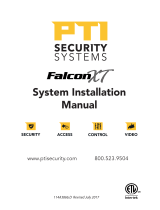Page is loading ...

Doc # INT-100086-001
Part No. 191518 Rev. 7
INSTALL INSTRUCTIONS
DTK-TSS4D
DITEK Technical Support Available 24/7
1-888-472-6100 www.ditekcorp.com
DITEK Corporation
ONE DITEK CENTER
1720 Starkey Road
Largo, FL 33771
INSTALLATION
Revised By: R. Mitchell 11-20-19
Approved By: R. Mitchell 11-6-17
This Surge Protective Device (SPD) is a high performance device, designed to provide protection
for sensitive electronic loads connected to service panels, fire panels, or where the SPD is
directly connected to the electronic device. Maximum protection will only be achieved if the SPD
is properly installed. Please read and follow the installation instructions carefully.
NOTICE: This SPD should be installed by a qualified electrician in accordance with the National
and Local Electrical Codes and the following instructions.
APPLICATION
Surge suppression for hardwired series installations for 120 VAC single branch circuits.
Model DTK-TSS4D has Dry Contacts for remote notification of surge protection status.
INSTRUCTIONS:
Caution: Measure all voltages to insure applied voltage does not exceed the voltage rating of
the unit. Improper installation voids the warranty.
NOTE: Suitable for use on a circuit capable of delivering not more than 10,000 rms symmetrical
Amperes when protected by a circuit breaker rated 20A and minimum 120 Volts.
Warning: No Serviceable Parts-Attention:Aucune pièce remplaçable ou réparable
NEMA ENCLOSURE MOUNTING
Enclosure can be mounted directly on to a panel, frame, or other mounting surface through
corner mounting holes that are visible when the cover is removed. Punch 1 knockout on each
end of the enclosure to allow for the input and output wiring connections. Corner hole
mounting and liquid tight connectors are required to maintain the NEMA 4X rating.
DTK-TSS4D WIRING INSTRUCTIONS
1. Turn off the power at the circuit breaker or main before beginning installation.
2. Securely mount this unit in series between the supply wiring and the equipment to be protected.
3. Allow 3 feet of conductor length between this device and the protected equipment. This will
allow the unit time to react.
4. Use minimum 12 AWG stranded wire for all hook ups.
5. Remove the top nut from the input, output and ground lugs. (Do not remove the lower lock nut)
6. Connect the ground (Green or Bare) supply and protected equipment wires to the ground lug using
one of the supplied ring terminals, replace the nut and torque to 10 inch pounds.
Ground Resistance Rule: Max ground resistance is 25 Ohms, 5 Ohms or less is optimum.
This cannot be an assumed value and must be measured to assure proper grounding.
7. Connect the neutral (White) supply and protected equipment wires to their respective neutral lugs
using 2 of the supplied ring terminals, replace the top nuts and torque to 10 inch pounds.
8. Connect the line (Black) supply and protected equipment wires to their respective line lugs
using 2 of the supplied ring terminals, replace the top nuts and torque to 10 inch pounds.
9. Install the plastic cover placing it over the threads and fasten with the included nylon nuts until snug.
10. After all connections have been made and no hazards exist, restore power.
11. Verify that the LED is on signifying surge protection active, AC power present and ground OK.
Conditions of Installation:
a) An insulated grounding conductor that is identical in size and insulation material and thickness to the grounded and
ungrounded circuit supply conductors, except that it is green with or without one or more yellow stripes, is to be installed as
part of the circuit that supplies the filter. Reference should be made to Table 250-122 of the National Electrical Code
regarding the appropriate size of the grounding conductor.
b) The grounding conductor mentioned in item a is to be grounded to earth at the service equipment or other acceptable
building earth ground such as the building frame in the case of a high-rise steel-frame structure.
c) Any attachment-plug receptacles in the vicinity of the filter are to be of a grounding type, and the grounding conductors
serving these receptacles are to be connected to earth ground at the service equipment or other acceptable building earth
ground such as the building frame in the case of a high-rise steel-frame structure.
d) Pressure terminal or pressure splicing connectors and soldering lugs used in the installation of the filter shall be
identified as being suitable for the material of the conductors. Conductors of dissimilar metals shall not be intermixed in a
terminal or splicing connector where physical contact occurs between dissimilar conductors unless the device is identified
for the purpose and conditions of use.

Doc # INT-100086-001
Part No. 191518 Rev. 7
INSTALL INSTRUCTIONS
DTK-TSS4D
DITEK Technical Support Available 24/7
1-888-472-6100 www.ditekcorp.com
DITEK Corporation
ONE DITEK CENTER
1720 Starkey Road
Largo, FL 33771
INSTALLATION
Revised By: R. Mitchell 11-20-19
Approved By: R. Mitchell 11-6-17
Illustrations Page
NEUTRAL NEUTRAL
LINE LINE
GROUND
INPUT OUTPUT
120 VAC Power To
Protected Equipment.
120 VAC Power In.
Enclosed In Conduit.
Supply Wiring
3' Of Conductor
Length
EXPECTED SYSTEM VOLTAGES
120 VAC
VOLTAGES
L-N
0
L-G N-G
120120
GND.
(G) GRN.
(L) BLK.1
(N) WHT.
IN
SUPPLY
OUT
EQUIPMENT
(G) GRN.
(L) BLK.1
(N) WHT.
NO C NC
DRY CONTACT
120VAC(+)
NEUTRAL(-)
LOAD: 48VDC, 0.6AMP (MAX)
EXAMPLE MONITORING CIRCUIT
EXAMPLE REMOTE MONITORING
USING FACP FOR NOTIFICATION
DTK-TSS4D
20 Amp Max
DTK-TSS4D DRY CONTACT OPERATION
The Dry Contacts are a SPDT Form 1C circuit rated 48VDC/0.6A, designed for low voltage or control
signals only, and activate if the Phase leg loses its surge protection. The Dry Contacts are accessed
by a three position terminal block (#28-16 AWG). The positions are marked Common (C),
Normally Open (NO), and Normally Closed (NC). If the surge protection is lost, the contacts will
reverse; Normally Open will close and Normally Closed will open.
There is no change to the Common (C)
/
